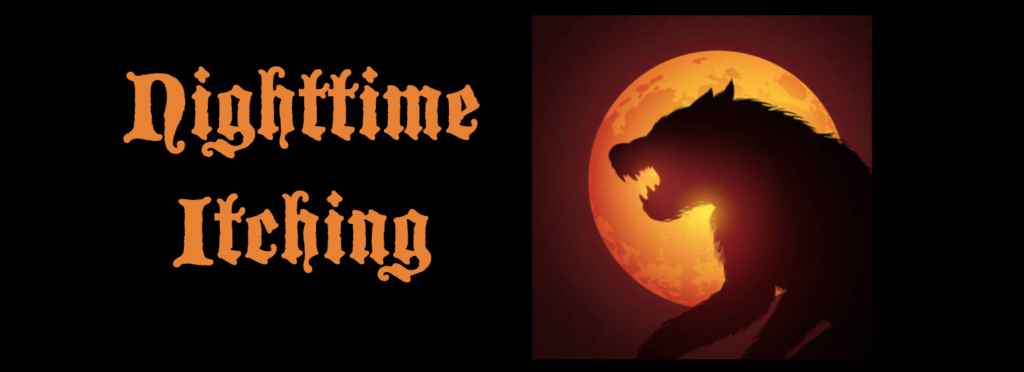
DRAFT — Itching at Night — DRAFT
Editor’s Note: The following abstract represents the cooperative efforts of the PRP community and Adobe AI. It began with a post from Rachel G., Mississippi, USA. [Onset Date mm/yyyy; Onset Age: XX]. The objective was to focus on ONE topic: Nighttime itching.
“Having another horrific night with the itching. I’m fine all day, but as soon as I lay down for bed my body engulfs in a burning itch. Nothing soothes it. I haven’t slept more than an hour or two at most in five nights.
“I am a stay at home mom with a five-year-old boy. My mental health is declining. I am absolutely miserable and exhausted. My crying even woke my husband.
“Why does the itching get so bad at night? As soon as I lay down for bed my body engulfs in a burning itch. Nothing soothes it. I haven’t slept more than an hour or two at most in five nights.
“I am a stay-at-home mom with a five-year-old boy. My mental health is declining. I am absolutely miserable and exhausted. My crying even wakes my husband.
“Why does the itching get so bad at night?”
This abstract provides a glimpse into the experiences of individuals living with PRP and their struggles with relentless itching. Through a series of online discussions, PRP patients and contributors share their personal stories and offer suggestions for itch relief. Overall, this document serves as a resource for PRP patients seeking insights and support in their journey to alleviate the distressing symptom of itching.
MAJOR POINTS
- Many individuals with pityriasis rubra pilaris (PRP) experience severe itching, particularly at night, which can significantly impact their sleep and mental health.
- Various strategies can provide relief from itching and improve sleep, including warm showers, hot water bottles, hydroxyzine, sunburn gel with lidocaine, and prescription sleep aids.
- It is important to advocate for oneself and consider seeking a second opinion.
Why is itching worse at night?
The document does not provide a specific reason for why itching gets worse at night for Pityriasis Rubra Pilaris (PRP) patients. However, it is a common phenomenon for many skin conditions, including PRP. There are a few possible explanations for this:
- Temperature and humidity: At night, the body temperature tends to rise, and the humidity levels may decrease. These changes can lead to increased dryness and irritation of the skin, which can exacerbate itching.
- Reduced distractions: During the day, individuals with PRP may be engaged in various activities that can distract them from the itching sensation. However, when they lie down to sleep, there are fewer distractions, making them more aware of the itching.
- Circadian rhythm: The body’s circadian rhythm, or internal clock, can influence various physiological processes, including skin inflammation and itching. It is possible that the circadian rhythm plays a role in the increased itching at night for PRP patients.
- Increased blood flow: Blood flow to the skin may increase at night, leading to heightened sensitivity and itching.
It is important to note that these are potential explanations based on general knowledge of skin conditions and itching. The specific reasons for increased itching at night in PRP patients may vary and should be discussed with a healthcare professional.
Sleep aids recommended by contributors?”
What works for one doesn’t work for all.
Hydroxyzine:Hydroxyzine is an antihistamine that can help with itching and also has sedative properties, making it useful for promoting sleep. Several contributors mentioned using hydroxyzine to help with nighttime itching and improve sleep quality.
Prescription sleep aids: Some contributors mentioned using prescription sleep aids such as Ambien (zolpidem) or Tylenol PM (acetaminophen with diphenhydramine) to help with sleep. These medications can provide relief from itching and promote better sleep.
CBD products: CBD (cannabidiol) products, such as CBD gummies or CBD-infused sleep aids, were suggested by a few contributors as a potential sleep aid for itching. CBD is known for its relaxing properties and may help with :sleep.
Over-the-counter antihistamines
Over-the-counter antihistamines like Claritin or Benadryl were mentioned by some contributors as sleep aids that can also help with itching. These medications can provide relief from itching and drowsiness, aiding in better sleep.
IMPORTANT
Consult with a healthcare professional before starting any new sleep aid, as they can provide personalized recommendations based on individual circumstances and medical history. Additionally, the effectiveness of sleep aids may vary from person to person, so it may require some trial and error to find the most suitable option.
